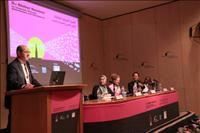Proceedings of the Third Global Seminar on Linguistic Diversity, Globalization and Development
Posted on

The Third Global Seminar on Linguistic Diversity, Globalization and Development proceeded for the second day at the BA.
The day commenced with a talk from Graham Fraser, Canada’s Commissioner of Official Languages, entitled “The Role of a Commissioner for Languages: The Case of Canada”. He dealt with the cases in which more than one language is considered an official language, and how that relates to citizen’s rights.
A Table on “Media and Multilingualism” was held featuring representatives of several institutions. Chris Rainier, from the National Geographic, stated that half of the world languages are at risk. As a reaction, they have launched the “Enduring Voices” project which aims at preserving the languages, heritage and culture of indigenous people. Nomazulu Mda, Manager of International Affairs at the South African Broadcasting Corporation, gave a study case of multi-lingual broadcasting in South Africa, featuring around 15 different languages with a quota for each.
In the same context, Hugo Barreto, Secretary-General of the Roberto Marinho Foundation, showed how media can support multilingualism and multi-culturalism. He demonstrated how this is done by the Brazil official television and Grupo Globo that fosters education, social inclusion and other issues. Gustavo Win, from Voice of America (VoA) that is operating in 47 different languages, stressed that language is an identity and thus we need to respect cultural heritage, accept the self and the other, and avoid discrimination.
A special session was devoted to multilingualism and families, hosting Ms. Anna Sole Mena who shared her personal experience as well as the research she conducted on multilingual children. She maintains that children naturally have an unlimited capacity to learn languages, which also means new cultures and thus the values of tolerance and plurality. The demerits include complications and confusion as well as some dangers of acquiring only limited vocabulary in each language and developing incorrect grammar.
The Second Table was entitled “Digital Technology and Diversity of Cultural and Linguistic Content” in which panelists shared various success stories. Hillary Wiesner, Director of the Islam Initiative of the Carnegie Foundation, introduced the initiative which aims to combat the stereotypes that Muslims in America are subjected to. She also presented other online initiatives including the American Media Voices and the Global Experts. Robert Moropa, representative of the Library of Congress, presented the World Digital Library, featuring the world’s best cultural contributions. With 32 partner organizations from all over the world, the project aims at narrowing the cultural gap and promoting understanding between different cultures and peoples. The WDL functions in seven languages – Arabic, Chinese, English, French, Portuguese, Russian, and Spanish – and includes content in more than forty languages. The BA is co-chairing the Technical Architecture Working Group (TAWG), through its ICT Sector, and Dr. Ismail Serageldin, Director of the Library of Alexandria, was elected as the Chairman of the Executive Council of WDL.
The “Memoires of the World” Project was introduced by Joie Springer from UNESCO. The project seeks to document the recorded collective legacy of the peoples of the world, in keeping with UNESCO’s strategy to build knowledge societies. The Memory of the World currently features 193 items from around different countries. Azza Ezzat, from the BA Calligraphy Center, showcased the Digital Library of Inscriptions, a digital record of writings found on historic buildings and works of art throughout the ages. More than 5,000 inscriptions are now available in a variety of languages: Ancient Egyptian, Arabic, Persian and Turkish, in addition to a collection of a variety of scripts.
Table Three was devoted to institutional presentations. Antoni Mir gave a presentation on Linguamón-House of Languages, and its future plans. Dr. Khaled Azab, Director of the BA Media Department, introduced one of the BA projects to document the journey of writing in Egypt. Stephanie Durand, Media Manager of the United Nations Alliance of Civilization (UNAOC) introduced the AOC different initiatives relating to youth activities, dialogue and pluralism.
Sozinho Franscisco Matsinhe, President of the African Academy for Languages, tackled the multilingualism of the Black Continent, resulting from the various indigenous languages, as well as colonial languages. Jarbas Montovanini, from the Museum of Portuguese Language, gave a virtual tour of the museum, the world’s first language museum.
In his concluding remarks at the closure of the seminar, Colin Williams, Research Professor in Sociolinguistic, called for launching collaborate initiatives to maintain world linguistic diversity, and open access of information and digital content.
The next Global Seminar will be held in Delhi, India, the coming year.
Click here to read the coverage of the first day.